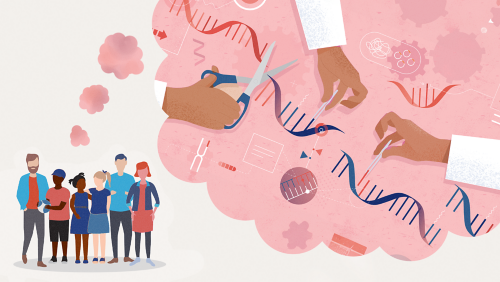St. Jude Family of Websites
Explore our cutting edge research, world-class patient care, career opportunities and more.
St. Jude Children's Research Hospital Home

- Fundraising
St. Jude Family of Websites
Explore our cutting edge research, world-class patient care, career opportunities and more.
St. Jude Children's Research Hospital Home

- Fundraising
Patient voices shape the future of gene therapy

An artistic rendering of patients, family members and health care professionals thinking about gene therapy. Graphic by Madison Rice.
When a disease is written in a person’s DNA, treatment has historically only been able to alleviate symptoms. However, the advent of genetic editing and associated gene therapy promises a paradigm shift for these diseases: rewriting the DNA sequence from diseased to normal. Several gene therapies are already approved for hereditary blood disorders, such as β-thalassemia and sickle cell disease. However, patient uptake for these treatments has been low overall, revealing a disconnect between those conceptualizing, creating and carrying out gene therapy treatments and patients who may be wary.
To understand that gap and learn how to bridge it, St. Jude researchers are going directly to patients, families and caregivers to better understand their hopes for and fears of gene therapy. Two ongoing clinical trials, BINFORMED and GENETX, seek to understand what individuals know about gene therapy and how they would like to learn about its risks and benefits.
“Before we can teach anything, we need to listen,” said Nidhi Bhatt, MD, St. Jude Department of Hematology, who is running BINFORMED, explained. “We want to build educational materials eventually, but first, we need to know people’s real questions and concerns, not just assume we know best.”
Both clinical trials use semi-structured interviews to allow interviewers flexibility in discovering patient priorities while covering desired information. In that partially standardized format, the interviewer asks about those priorities from a bank of predetermined questions. However, they also use reflective listening and other interpersonal communication techniques to help trial participants discuss what matters most to them, regardless of how well it matches the scripted question set.
Assessing knowledge before and after gene therapy
Bhatt’s team is looking for a holistic picture of how patients encounter treatment information before choosing whether to pursue it. The investigators want to establish the baseline understanding of gene therapy across multiple stakeholders, from patients to their caregivers to health care professionals, such as nurses.
In contrast, GENETX seeks to look back in time from the perspective of patients who did or did not choose gene therapy and health care workers who have supported such patients.
“We want to make sure patients are well informed and feel prepared if they choose gene therapy,” said the principal investigator for GENETX, Liza-Marie Johnson, MD, MPH, MSB, St. Jude Bioethics Program director and Department of Oncology associate member. “We want to reduce surprises, those ‘oh-I-didn’t-expect-this’ moments. So, we’re finding out from former patients and care staff what they wish they would have known.”
As an example of the disconnect between expectations and experience, many patients who receive gene therapy for sickle cell disease point to mucositis. Mucositis is a painful inflammation of mucous membranes in the mouth and digestive tract. Patients almost universally confirm they were warned about the potential issue but did not feel these warnings sufficiently described what they ultimately experienced.
“We’re going to take that kind of feedback from lived experiences with gene therapy and incorporate it into our educational communication,” Johnson explained. “Then, someone considering gene therapy will have access to the most useful and informative content.”
Informed consent is imperative for gene therapy
Both clinical trials are motivated by gene therapy’s unique benefit: It is potentially transformative and life-altering, changing a patient’s DNA, but also poses unique considerations. Unlike traditional drugs, gene therapy cannot be discontinued. Once a patient receives gene therapy, its changes may be with them for the rest of their life. That emphasizes the importance of creating truly informed consent.
“When patients sign up for these complex and life-altering treatments that are hard to explain,” Bhatt said, “we must exhaust all avenues to ensure the patient has a good understanding to give truly informed consent.”
Communicating complex medical treatments can have many issues and many potential pitfalls derived from culture. Patients from different places have varied concerns and preferences. Bhatt is now working with collaborators in five countries, including Nepal, Vietnam, Peru, Thailand and Sri Lanka, to find the best way to approach people in these local contexts.
“The treatment landscape looks different in resource-limited countries, where access to standard care can be sparser, giving patients a different level of enthusiasm than in well-resourced countries,” Bhatt said. “As for culture, we must account for things like the highly hierarchical reception of health care in some places, where physicians are respected far more than other staff like nurses, in future educational initiatives.”
Leading patients to the best lives is part of the DNA of St. Jude
“We maybe have one chance to get communication right about gene therapy for sickle cell disease for some of these patients and families,” Johnson said. To understand how gene therapy education can be improved, GENETX is interviewing patients who chose not to pursue the treatment. By combining the information from people who accepted and rejected gene therapy, Johnson’s team hopes to expand information about the side effects of gene therapy treatments through an online educational platform they recently developed to help patients choose between treatment options for sickle cell disease (myscdstory.org).
“We cannot forget that these are incredibly hard decisions patients have to make, and it requires a lot of health literacy to understand and make those choices,” Bhatt said. “We want patients to know that they can keep speaking up because we’re listening, and we want to know their expectations, hopes and even worries so that we can provide the information they need to empower them to choose their own future.”
“As physicians and scientists, we need to do better when communicating with families about novel treatments like gene therapy,” Johnson said. “Thankfully, families are the best people to tell us what they need and are willing to share their voices with us so we can find the most effective ways to guide them to the treatments that will lead them to their most fulfilling lives.”






